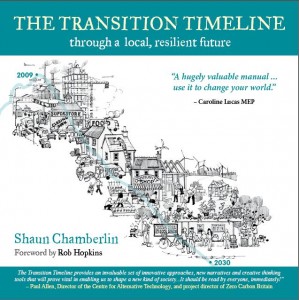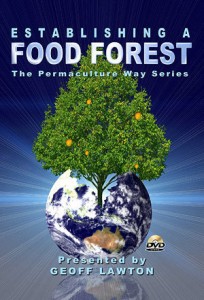Transition Culture has moved
I no longer blog on this site. You can now find me, my general blogs, and the work I am doing researching my forthcoming book on imagination, on my new blog.
Come find me at robhopkins.net
16 Feb 2009
 I am very excited to announce that coming very soon is Shaun Chamberlin’s book The Transition Timeline: for a local resilient future. If you liked the Transition Handbook, you’re going to love this too. This is also your first look at the cover, which is the work of Jennifer Johnson, the artist who did the cover of the Handbook. We love it. I will tell you more about the book as we get closer to the publication date of March 19th (it will be available via. this website, among other places), but for now, I’ll leave it to the author himself to tell you about it himself, courtesy of the wonderful Traydio.com, and also the blurb from the advance publicity. You can also download the press release here.
I am very excited to announce that coming very soon is Shaun Chamberlin’s book The Transition Timeline: for a local resilient future. If you liked the Transition Handbook, you’re going to love this too. This is also your first look at the cover, which is the work of Jennifer Johnson, the artist who did the cover of the Handbook. We love it. I will tell you more about the book as we get closer to the publication date of March 19th (it will be available via. this website, among other places), but for now, I’ll leave it to the author himself to tell you about it himself, courtesy of the wonderful Traydio.com, and also the blurb from the advance publicity. You can also download the press release here.
Read more»
16 Feb 2009
 Last time I did this people seemed to really enjoy it, so here is a snapshot of news stories and Transition happenings from around the world over the past month or so, both successes and failures. Transition Town Romsey launch a garden share scheme modelled on the one in Totnes, Transition Town Wivenhoe make good headway, but unfortunately, Malvern Council decide it is still too premature to endorse their local Transition initiative. In Northern Ireland, Transition Omagh are starting to stir, and in the US, peak oil blogger ‘Peak Oil Hausfrau”, is wavering between feeling despondent and getting involved in Transition.
Last time I did this people seemed to really enjoy it, so here is a snapshot of news stories and Transition happenings from around the world over the past month or so, both successes and failures. Transition Town Romsey launch a garden share scheme modelled on the one in Totnes, Transition Town Wivenhoe make good headway, but unfortunately, Malvern Council decide it is still too premature to endorse their local Transition initiative. In Northern Ireland, Transition Omagh are starting to stir, and in the US, peak oil blogger ‘Peak Oil Hausfrau”, is wavering between feeling despondent and getting involved in Transition.
Read more»
13 Feb 2009
 I attended a great event yesterday at the Royal Agricultural College near Cirencester, organised by South West Rural Update looking at rural responses to peak oil and climate change. One of the first speakers was Nigel Curry (Director of the Countryside and Community Research Institute), who was asked, in 5 minutes, to respond to the question “can we live better and consume less?” His response was that consuming less is in fact the only way to live better, and to illustrate his point, he set out 9 tips for societal and individual happiness. Given that part of the purpose of Transition is “building resiIience and happiness”, I thought they were really useful, so I scrawled them down and offer them to you here this morning (I hope I’ve got them right, he did speak very fast).
I attended a great event yesterday at the Royal Agricultural College near Cirencester, organised by South West Rural Update looking at rural responses to peak oil and climate change. One of the first speakers was Nigel Curry (Director of the Countryside and Community Research Institute), who was asked, in 5 minutes, to respond to the question “can we live better and consume less?” His response was that consuming less is in fact the only way to live better, and to illustrate his point, he set out 9 tips for societal and individual happiness. Given that part of the purpose of Transition is “building resiIience and happiness”, I thought they were really useful, so I scrawled them down and offer them to you here this morning (I hope I’ve got them right, he did speak very fast).
Read more»
11 Feb 2009
 Geoff Lawton is a permaculturist’s permaculturist. As one of the first ‘wave’ of designers and teachers in Australia, he has been implementing and thinking about permaculture for many years, and has become internationally recognised as a repairer of landscapes, and a creator, even in the most unpromising ecosystems, of food forests and abundant, productive landscapes.
Geoff Lawton is a permaculturist’s permaculturist. As one of the first ‘wave’ of designers and teachers in Australia, he has been implementing and thinking about permaculture for many years, and has become internationally recognised as a repairer of landscapes, and a creator, even in the most unpromising ecosystems, of food forests and abundant, productive landscapes.
Read more»
11 Feb 2009
 Last week, Colin Hines spoke at St. John’s Church in Bridgetown as part of an evening event called ‘Money, Money, Money’. Colin is the convenor of the Green New Deal, advisor to Caroline Lucas MEP and author of ‘Localisation: a global manifesto‘. In spite of it being a foul night, cold, wet and wild, and it being an evening about economics, over 80 people turned up. I present here a record of his talk, compiled from my scrawled notes. Any mistakes here are entirely due to my never having learned shorthand as a child.
Last week, Colin Hines spoke at St. John’s Church in Bridgetown as part of an evening event called ‘Money, Money, Money’. Colin is the convenor of the Green New Deal, advisor to Caroline Lucas MEP and author of ‘Localisation: a global manifesto‘. In spite of it being a foul night, cold, wet and wild, and it being an evening about economics, over 80 people turned up. I present here a record of his talk, compiled from my scrawled notes. Any mistakes here are entirely due to my never having learned shorthand as a child.
“This is the best of times, and it is the worst of times. For some sections of our society it is already becoming the worst of times, with people losing their homes and being deeply worried as things becoming more and more dire and insecure. It is the best of times in that dramatic change only comes at times of economic instability.
Read more»
 I am very excited to announce that coming very soon is Shaun Chamberlin’s book The Transition Timeline: for a local resilient future. If you liked the Transition Handbook, you’re going to love this too. This is also your first look at the cover, which is the work of Jennifer Johnson, the artist who did the cover of the Handbook. We love it. I will tell you more about the book as we get closer to the publication date of March 19th (it will be available via. this website, among other places), but for now, I’ll leave it to the author himself to tell you about it himself, courtesy of the wonderful Traydio.com, and also the blurb from the advance publicity. You can also download the press release here.
I am very excited to announce that coming very soon is Shaun Chamberlin’s book The Transition Timeline: for a local resilient future. If you liked the Transition Handbook, you’re going to love this too. This is also your first look at the cover, which is the work of Jennifer Johnson, the artist who did the cover of the Handbook. We love it. I will tell you more about the book as we get closer to the publication date of March 19th (it will be available via. this website, among other places), but for now, I’ll leave it to the author himself to tell you about it himself, courtesy of the wonderful Traydio.com, and also the blurb from the advance publicity. You can also download the press release here.




